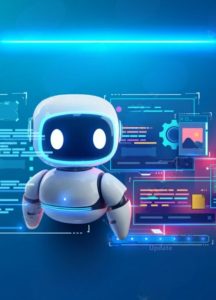What is AI-augmented Software Development?
Amidst the seismic shift in the detail-focused software engineering field, AI integration has proved to be a boon enabling improved code quality, faster project or DevOps delivery and informed decision making. Recent advancements such as artificial intelligence-augmented procedures are fundamentally shifting software development. These are also redefining best practices, increasing deployment speed, accuracy, and reshaping productivity apart from enhancements in libraries and frameworks. Furthermore, AI development services can automate mundane and repetitive tasks, thus allowing companies to amplify various aspects of software development including optimizing resource allocation, surging improvement in efficiency, and strategizing architecture-related initiatives.
As a subset of AI, generative AI is another tool that is introducing innovation in the field of software development. It can effectively analyze large volumes of big data, gather user and developer feedback in software requirement planning, assess customer requests and evaluate market trends for technical adoption across development procedures. Renowned Generative AI services and tools such as Jasper and Copilot have already been integrated for swift code generation in various organizations globally, while it also helps in workload optimization in cases of cloud resources. The AI-augmented software engineering market was valued at US $3.14 billion in 2024 and is expected to reach an approximate value of US $4.67 billion by the end of 2025 increasing at a CAGR of 46.9%.

Growing market size of AI-augmented software development during the forecast period 2024 to 2029
Benefits of AI-augmented Software Engineering
Given below are the advantages of integrating AI in software engineering that can improve quality of code, software and application development and maintenance alongside efficient deliveries.
Enhanced Productivity
AI can be very useful in automating mundane tasks such as bug fixing, formatting of codes or refactoring. Developers can focus on complex problems or on designing high-level architecture. This ultimately leads to quick development cycles and improved creativity in terms of solving challenges.
Improved Code Quality
AI-augmented development also involves code analysis that can be used to detect bugs, vulnerabilities in security and inefficiencies in the software development process. Ai-powered code analysis can lead to increase in code robustness, cleanliness and reduced production-related errors.
Reduced Time to Market
As it can handle routine tasks and suggest intelligent AI solutions in retail and other fields, resulting in faster time to market and streamlined development process. This is because the overall time from concept to deployment is shortened through automation, thus allowing business to release products and their respective updates faster in the market.
Smarter Testing
AI-augmented development assists in smarter debugging through identification of root cause and intelligently suggests possible fixes such that minimum iterations can be expected. Tools like SOTI Snap are enhanced with integration of AI and can be used to simulate various environmental conditions, therefore many potential issues can be identified in real-time in case they get missed out during manual testing.
Enriched Code Suggestions
As mentioned earlier, tools such as GitHub Copilot, Amazon CodeWhisperer, Amazon Codey etc. use large language models (LLMs) can be used to enhance code snippets, assist auto-completion, suggestions, provide entire functions etc. to fasten software and repetitive coding action items.
Personalized Assistance
AI can also be used to understand coding styles and preferences of developers as a personalized coding assistant over time. It is capable of providing context-aware recommendations for aligning patterns and practices of developers.
Better Security
With AI, newer types of vulnerabilities in security and potential code exploits can be identified in real-time alongside effective and proactive recommendations for patching. The software developed is made sure to be secure by recognizing flaws in case they get missed during manual audits.
Decreased Costs
As AI gets integrated in the development process, the occurrences of human errors are drastically reduced, and the development process works out more efficiently. Also, the need for extensive manual reviews, debugging or rework is eliminated. This leads to the lowering of the overall cost of software development which would otherwise have been utilized for manual intervention.
Continuous Learning
AI-augmented development involves constant evolution through user feedback, historical projects and external data for analysis. With continuous improvement, tools for software development can become accurate, effective and adaptable to the latest technologies, advancements and trends.
Advanced Analytics
These tools can be used to provide valuable insights into project health, quality, coding patterns and development workflows. This in turn helps developers and project managers to make informed decisions, predict potential bottlenecks and optimize overall processes.
Refined Collaboration
AI can be used for intelligent document generation and assist in enhancing collaboration amongst various teams. It can automatically update project management systems such as stock monitoring systems, as per meetings and decisions taken, translate technicalities into an understandable format for business stakeholders etc.
Key Use Cases of AI-augmented Software Engineering
The fundamental process involving various stages of the application development cycle such as building, testing and maintenance is being transformed using AI. Given below are some of the use cases:
1. Auto Code Generation: The software AI tools like Tabnine are trained on large codebases, context and historical codes, learn common patterns and best practices. They then autocomplete codes and suggest newer code snippets, blocks and functions asper variable names, data types and surrounding logic by using transformers like GPT-3, GPT-4 and deep learning techniques. This reduced manual coding effort and syntax errors while speeding up development.
2. Auto Code Refactoring: Large codebases can be refactored using augmented software development tools like Refactor.ai, Google Bard etc. to improve readability and ease maintenance without changing functionality through simplification of complex functions, removal of redundant code and improvised variable names. These tools use static code analysis to detect outdated coding practices, inefficient patterns, duplicated codes, deep nesting, as well as machine learning models to predict refactoring patters as per changes in historical code and preferences of the developer. It improves code quality, reduces technical debt, ensures scalability and maintainability.
3. Optimized CI/CD Pipeline: AI can predict effective deployment strategies, automate necessary rollback decisions in real-time to optimize continuous integration and deployment pipelines by analyzing previous deployment data, success or failure rates, response times, resource utilization and more. By using reinforcement learning agents to adjust pipeline configurations as per provided feedback assuring minimal downtime or disruption in user flow and resilient CI/CD pipelines.

AI-augmented software development for improving DevOps and CI/CD pipelines
4. Auto Unit Test Generation: AI-augmented software engineering can automatically generate unit tests for existing code, improve software reliability and test coverage. For example, tools like Test.ai utilize deep reinforcement learning-powered symbolic execution and genetic algorithms to analyze structure of functions, cover generation of wide range of code paths and logical branches in edge test cases.
5. Predictive Code Analytics: Project delays, issues in quality, constraints in resources etc. can be predicted using AI tools that scrutinize historical data. One example can be tools like CodeSense that utilize ML algorithms like regression models, clustering to track code changes, analyze large codebases, project timelines, bug reports, developer performance, resource allocation issues etc. to predict bottlenecks and identify modules or code hotspots that potentially require frequent maintenance.
6. Intelligent Code Reviews: Tools like CodeClimate and Codacy employee static analysis of code style, patterns, complexity, structure, quality, security flaws to ensure adherence to coding standards, guidelines, best practices and identify potential bugs during pull requests. They then suggest optimizations as per learnt insights from codebase corpus to enhance code reviews even during early development stages.
7. Others: AI-augmented development models like DeepCode, SonarQube analyze source code for bugs, their patterns (race conditions, buffer overflows), code comments, anomalies, cross-relating past errors, and patch them autonomously by cross-referencing via pattern recognition and machine learning, natural language processing (NLP) etc. Tools such as Snyk, WhiteSource are powered by AI-based threat modeling to prioritize code vulnerabilities, dependencies and third-party libraries. They learn from vulnerability databases like OWASP Top 10 against novel security flaws and integrate with CI/CD pipelines during merge or commit actions to reduce the risk of exploitation.
The Bottom Line
KritiKal Solutions is committed to staying ahead of AI-augmented software engineering through thorough research and integration of AI in every development cycle. AI has assisted in faster code generation, improved efficiency and delivered various benefits. Though at the same time, AI-enabled software development services also raise ethical concerns including job displacement, bias, creative losses, which need to be tackled over time. KritiKal is transforming software development strategies while carefully considering its profound impact on society and related challenges. Please get in touch with us at sales@kritikalsolutions.com to know more about our innovative, automated software development processes and realize your AI requirements.

Jami Yaswanth Sai Kumar works as a Senior Software Engineer at KritiKal Solutions. He is proficiently skilled in working with Artificial Intelligence, Machine Learning, Computer Vision, Algorithmic Designing, Statistical Data Analysis etc., and holds hands on experience in various programming languages such as Python, C++, SQL and more. He has dedicatedly helped KritiKal in delivering many successful projects for some major clients.



 Global
Global  United States
United States 

